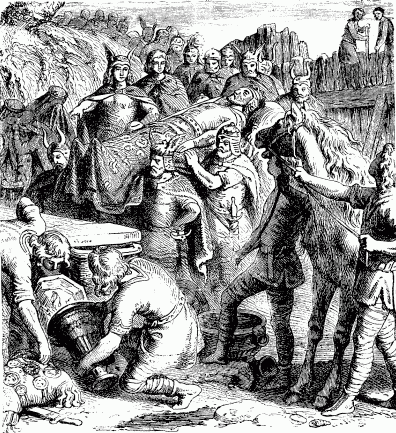
The sons of the great Theodosius were, like almost all the children of the Roman Emperors, vain and weak, spoiled by growing up as princes. Arcadius, who was eighteen, had the East, and was under the charge of a Roman officer called Rufinus; Honorius who was only eleven, reigned at Rome under the care of Stilicho, who was by birth a Vandal, that is to say, of one of those Teutonic nations who were living all round the northern bounds of the empire, and whose sons came to serve in the Roman armies and learn Roman habits. Stilicho was brave and faithful, and almost belonged to the imperial family, for his wife Serena was niece to Theodosius, and his daughter Maria was betrothed to the young Honorius.
Stilicho was a very active, spirited man, who found troops to check the enemies of Rome on all sides of the Western Empire. Rufinus was not so faithful, and did great harm in the East by quarrelling with Arcadius' other ministers, and then, as all believed, inviting the Goths to come out of their settlements on the Danube and invade Greece, under Alaric, the same Gothic chief who had been a friend and companion of Gratian, and had fought under Theodosius.
They passed the Danube, overran Macedon, and spread all over Greece, where, being Arian Christians, they destroyed with all their might all the remaining statues and temples of the old pagans; although, as they did not attack Athens, the pagans, who were numerous there, fancied that they were prevented by a vision of Apollo and Pallas Athene. Arcadius sent to his brother for aid, and Stilicho marched through Thrace; Rufinus was murdered through his contrivance, and then, marching on into the Peloponnesus, he defeated Alaric in battle, and drove him out from thence, but no further than Epirus, where the Goths took up their station to wait for another opportunity; but by this time Arcadius had grown afraid of Stilicho, sent him back to Italy with many gifts and promises, and engaged Alaric to be the guardian of his empire, not only against the wild tribes, but against his brother and his minister.

This was a fine chance for Alaric, who had all the temper of a great conqueror, and to the wild bravery of a Goth had added the knowledge and skill of a Roman general. He led his forces through the Alps into Italy, and showed himself before the gates of Milan. The poor weak boy Honorius was carried off for safety to Ravenna, while Stilicho gathered all the troops from Gaul, and left Britain unguarded by Roman soldiers, to protect the heart of the empire. With these he attacked Alaric, and gained a great victory at Pollentia; the Goths retreated; he followed and beat them again at Verona, driving them out of Italy.
It was the last Roman victory, and it was celebrated by the last Roman triumph. There had been three hundred triumphs of Roman generals, but it was Honorius who entered Rome in the car of victory and was taken to the Capitol, and afterwards there were games in the amphitheatre as usual, and fights of gladiators. In the midst of the horrid battle a voice was heard bidding it to cease in the name of Christ, and between the swords there was seen standing a monk in his dark brown dress, holding up his hand and keeping back the blows. There was a shout of rage, and he was cut down and killed in a moment; but then in horror the games were stopped. It was found that he was an Egyptian monk named Telemachus, freshly come to Rome. No one knew any more about him, but this noble death of his put an end to shows of gladiators. Chariot races and games went on, though the good and thoughtful disapproved of the wild excitement they caused; but the horrid sports of death and blood were ended for ever.
Alaric was driven back for a time, but there were swarms of Germans who were breaking in where the line of boundary had been left undefended by the soldiers being called away to fight the Goths. A fierce heathen chief named Radegaisus advanced with at least 200,000 men as far as Florence, but was there beaten by the brave Stilicho, and was put to death, while the other prisoners were sold into slavery. But Stilicho, brave as he was, was neither loved nor trusted by the Emperor or the people. Some abused him for not bringing back the old gods under whom, they said, Rome had prospered; others said that he was no honest Christian, and all believed that he meant to make his son Emperor. When he married this son to a daughter of Arcadius, people made sure that this was his purpose. Honorius listened to the accusation, and his favorite Olympius persuaded the army to give up Stilicho. He fled to a church, but was persuaded to come out of it, and was then put to death.
And at that very time Alaric was crossing the Alps. There was no one to make any resistance. Honorius was at Ravenna, safe behind walls and marshes, and cared for nothing but his favorite poultry. Alaric encamped outside the walls of Rome, but he did not attempt to break in, waiting till the Romans should be starved out. When they had come to terrible distress, they offered to ransom their city. He asked a monstrous sum, which they refused, telling him what hosts there were of them, and that he might yet find them dangerous. "The thicker the hay, the easier to mow," said the Goth. "What will you leave us then?" they asked. "Your lives," was the answer.
The ransom the wretched Romans agreed to pay was 5000 pounds' weight of gold and 30,000 of silver, 4000 silk robes, 3000 pieces of scarlet cloth, and 3000 pounds of pepper. They stripped the roof of the temple in the Capitol, and melted down the images of the old gods to raise the sum, and Alaric drew off his men; but he came again the next year, blocked up Ostia, and starved them faster. This time he brought a man named Attalus, whom he ordered them to admit as Emperor, and they did so; but as the governor of Africa would send no corn while this man reigned, the people rose and drove him out, and thus for the third time brought Alaric down on them. The gates were opened to him at night, and he entered Rome on the 24th of August, 410, exactly eight hundred years after the sack of Rome by Brennus.

Alaric did not wish to ruin and destroy the grand old city, nor to massacre the inhabitants; but his Goths were thirsty for the spoil he had kept them from so long, and he gave them leave to plunder for six days, but not to kill, nor to do any harm to the churches. A set of wild, furious men could not, of course, be kept in by these orders, and terrible misfortunes befell many unhappy families; but the mischief done was much less than could have been expected, and the great churches of St. Peter and St. Paul were unhurt. One old lady named Marcella, a friend of St. Jerome, was beaten to make her show where her treasures were; but when at last her tormentors came to believe that she had spent her all on charity, they led her to the shelter of the church with her friends, soon to die of what she had undergone. After twelve days, however, Alaric drew off his forces, leaving Rome to shift for itself. Bishop Innocent was at Ravenna, where he had gone to ask help from the Emperor; but Honorius knew and cared so little that when he was told Rome was lost, he only thought of his favorite hen whose name was Rome, and said, "That cannot be, for I have just fed her."
Alaric marched southward, the Goths plundering the villas of the Roman nobles on their way. At Cosenza, in the extreme south, he fell ill of a fever and died. His warriors turned the stream of the river Bionzo out of its course, caused his grave to be dug in the bed of the torrent, and when his corpse had been laid there, they slew all the slaves who had done the work, so that none might be able to tell where lay the great Goth.